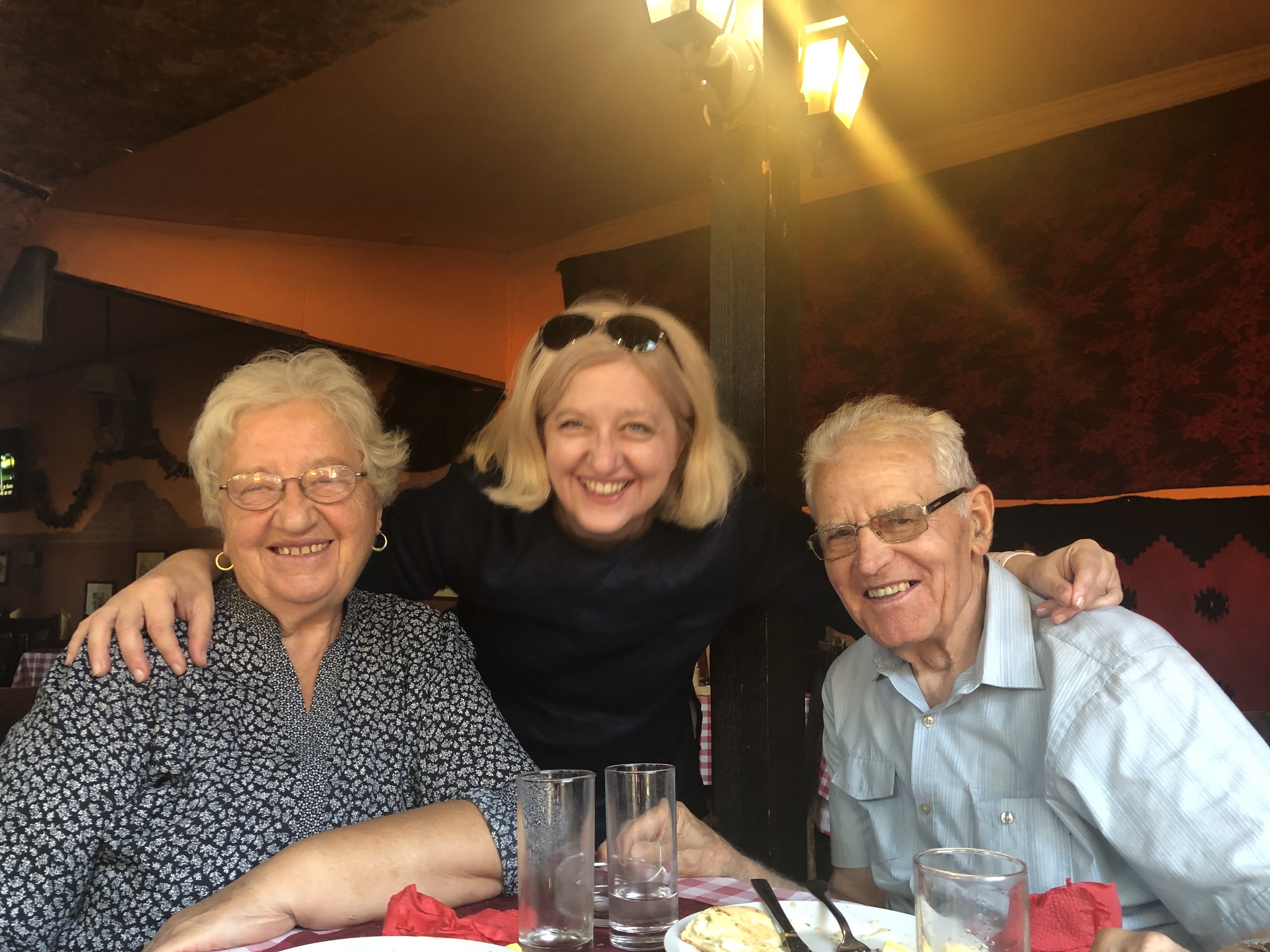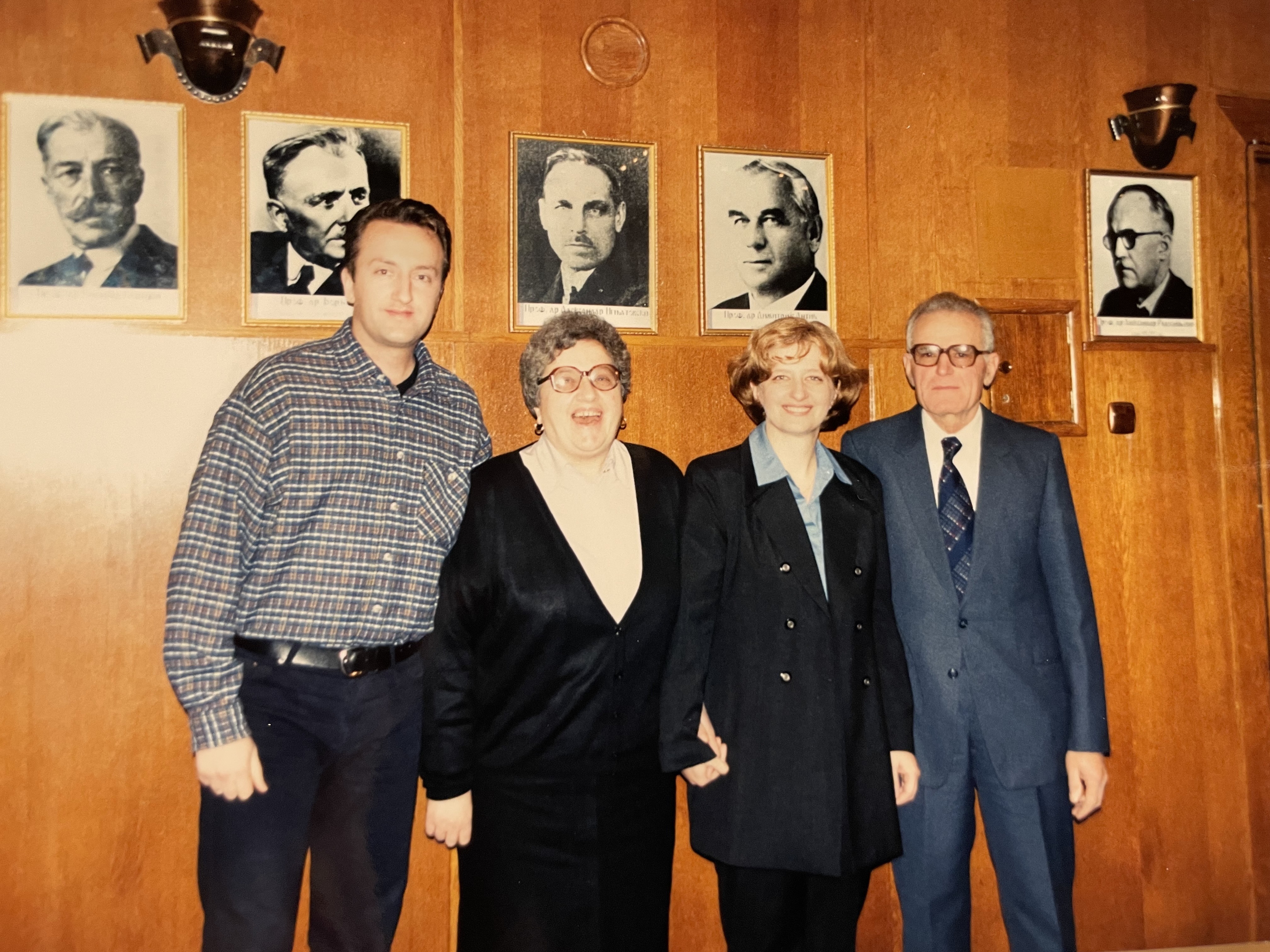

“I grew up in a country that no longer exists – Yugoslavia,” began Anuska Andjelkovic-Zochowski, MD, PhD, Professor of Pathology at the University of Michigan. “Both of my parents and my family were raised in what is now known as Serbia, in a university town in the southern region called Nis. Nis is the second largest city in Serbia. The society there is much different than it is here. It was a Communist or Socialist country. On paper, women could have free education and be a full part of society. But reality and paper were two different things. Women were educated, but they were never allowed to be in leadership positions. Women were expected to be mothers and take care of the home and the men were the providers. A very traditional, patriarchal society.”
Andjelkovic-Zochowski was raised differently by her mother, who, like the rest of her family, had higher education. “My mother worked within the political structure and advanced to a leadership role but was never considered for a senior leadership position. That wasn’t possible. The only way for women to advance was for them to be involved in politics.” Her father was an engineer, others were teachers, lawyers, engineers, and economists, but her uncle was a surgeon, and he is the one who sparked her interest in medicine. “My uncle was unable to have his own children, so he became very involved in our lives. He really wanted me to go into medicine. My father, however, wanted me to be an engineer.”
High school was similar to our community college experience. In her first two years of high school, she took every math and physics course offered. But in the second year, she met a woman professor of genetics and molecular biology. “I fell in love with the subject. It was a true turning point for me. As I finished high school, I was trying to decide between molecular biology and medicine, and she encouraged me to go into medicine. She told me that if I am a doctor, I can also do molecular biology. But if I am a molecular biologist, I cannot do medicine.”
So, Andjelkovic-Zochowski pursued medicine. As a medical student, she thought she would end up in psychiatry, but then realized it was not something she would enjoy. She enjoyed basic science and understanding the mechanisms of disease but did not enjoy the clinic setting. This guided her to pathology. She was still interested in the brain, so she pursued a master’s and PhD in neurosciences in Belgrade. “My PhD supervisor, Dr. Nada Zecevic, designed a very specific program and shaped it just like a PhD program in the United States. She had been a visiting scholar at Yale for 20 years. It was a cutting-edge program at a time of many new discoveries in neurobiology, neuro-restoration, and brain chemistry.”
As she was completing her postdoctoral studies, Andjelkovic-Zochowska met Dr. Sandra Hewete, who was in the lab next door. “She was an amazing young woman. She was the first female professor in the department where I was doing my postdoctoral research. I admire her energy and courage. She always said to never allow anyone to pass you by because you are a woman. Don’t let them put you down. She was a strong woman scientist. She gave me the courage to navigate the system.”
"She always said to never allow anyone to pass you by because you are a woman. Don’t let them put you down."
At this time, the civil war in Yugoslavia was underway, and Andjelkovic-Zochowski’s PhD mentor left in 1994 to escape the war and later became a professor at the University of Connecticut.
“I faced tremendous numbers of existential problems and career problems. I never joined a political party and never wanted to get involved in politics. I couldn’t have a normal life there. Science opened my mind to what was beyond politics. I tried to keep life normal and not be part of the craziness at the time.”
This was a tumultuous six years of her life and as soon as the war with Bosnia ended in 1996, her postdoctoral supervisor invited her to come study with her and she emigrated to the United States with great hopes for her future.
 When she arrived, “I was now facing adaptation to a new country, a new system, all new things. There was a language barrier, a new society, so much to learn.” Andjelkovic-Zochowski was not alone, however. “I was lucky as my peer supervisor during my PhD program in Serbia was working here and had been here for two years. She invited me to come and work with her to help me develop as a scientist.” This mentor also helped her navigate all the new processes and systems she encountered in the United States. “But there were not too many obstacles for me here in the United States. Here, you can do what you love and what you want. There, you can’t do anything. It was a struggle for everything.” Andjelkovic-Zochowski is also very thankful for her postdoctoral supervisor, Dr. Joel Pachter, who was an amazing man and a good friend to her. “During the bombing of Serbia in 1999, it was awful. My parents were still there. I was very concerned for them and he was like a father figure for me during that time.”
When she arrived, “I was now facing adaptation to a new country, a new system, all new things. There was a language barrier, a new society, so much to learn.” Andjelkovic-Zochowski was not alone, however. “I was lucky as my peer supervisor during my PhD program in Serbia was working here and had been here for two years. She invited me to come and work with her to help me develop as a scientist.” This mentor also helped her navigate all the new processes and systems she encountered in the United States. “But there were not too many obstacles for me here in the United States. Here, you can do what you love and what you want. There, you can’t do anything. It was a struggle for everything.” Andjelkovic-Zochowski is also very thankful for her postdoctoral supervisor, Dr. Joel Pachter, who was an amazing man and a good friend to her. “During the bombing of Serbia in 1999, it was awful. My parents were still there. I was very concerned for them and he was like a father figure for me during that time.”
Andjelkovic-Zochowsi became a successful research scientist studying the cerebrovascular biology of the brain and the blood-brain barrier. She is focused on understanding the physiology and pathology of the blood-brain barrier in neurological diseases (stroke, cerebrovascular malformation, vascular dementia) and identifying potential ways to model the blood-brain barrier for efficient treatment of diseases. Over the years, she has noticed more women in science programs and labs than 20 years ago. “More are involved in leadership roles and are more visible. More women are leading research programs and labs. When I sat on my first study section at the NIH, few women were at the table. Now, half are women sitting there. Conferences used to be almost all men, but now there are many more women. Women are becoming more independent in science.”
About 90% of Andjelkovich-Zochowski’s laboratory are women, including students and postdocs. “I am also lucky that my best friend from Serbia is a research faculty in my laboratory,” she added. She loves to work with undergraduate and graduate students as they prepare for medical school. “Most of the undergrads from my lab are in medical school or science, some pursued both. One is a professor at Yale.” She is often asked by her students how will they be able to manage life – will they be able to have a family life and not just a career? “I tell them to be an organized person and then you can have a balanced life. Find the right partner and create the right balance in your life. If you give up one for the other, you will be very sorry. Regardless of what they choose, be who they are and find balance. Be happy. I am very proud of my students. All of the girls are succeeding in what they do and have found balance in their lives.”
"I tell them to be an organized person and then you can have a balanced life. Find the right partner and create the right balance in your life."
In looking back over her life, she is very grateful for her parents, both of whom passed away two years ago. “It is very important how your parents raise you and open your eyes and encourage you to be who you are as a woman… I had the support of my parents and that is key for women to succeed.” She also values the right partner in life. “I have 100% support from my husband, as did my mother. My father never stopped my mother and my husband never stopped me. He encouraged my mother to do more and not stop. My husband does the same. I don’t need to fight for it. I made a good choice for a husband.” She also wants to express her gratitude for the support she received early in her career at Michigan from Dr. Richard Keep in neurosurgery and Dr. Steven Kunkel in pathology. “When I came and started my lab, I needed, as a younger assistant professor, someone I could talk to, an older mentor. Not someone to do your work for you, but someone you can talk to without worrying. They were fantastic!”